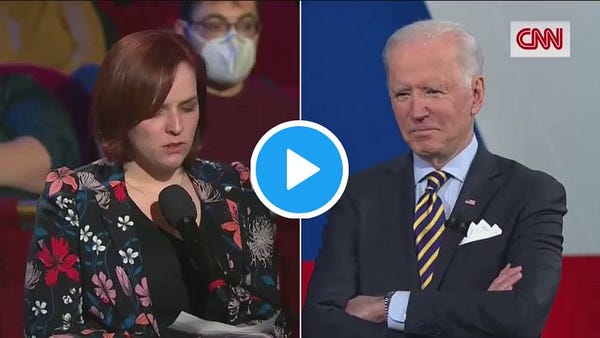Moralism about “bailing people out” isn’t going to help our economy and get people back on their feet. And it’s bad politics too.
If you’ve enjoyed the ad-free Signorile Report since it launched, or began reading recently, please think about becoming a paid subscriber and supporting independent opinion journalism, for roughly the cost of a cup of coffee at $5 per month. Thanks!
Last week on my SiriusXM program, a listener named George from Colorado called in to say that student loan debt forgiveness is a “terrible idea.”
Why?
Because these students “took out the loan” and “they should understand how to pay it back” and if “they haven’t figured that out” they’re “too stupid to go to college” and they’re “not going to be able to get a loan for a house if they’re that ignorant.”
Listen to the clip yourself. When I explained how callous that was — that no one took out a loan with the intent of not paying it, but that we’ve faced massive economic challenges that have hobbled people — George wasn’t having any of it. When I asked if he received a check from the government in Covid relief bills he accused me of changing the subject.
He then just repeated, “they signed a loan.”
This seems to me to be the main argument against student loan debt forgiveness, and it’s steeped in moralism. And when you dig deeper they’re making an argument about not wanting to “pay for” other people — when in fact we’re all paying for each other as a way to keep the economy afloat by keeping each other afloat.
The topic came up on the program after Joe Biden told a woman at a CNN town hall last week that he didn’t support canceling $50,000 in student loan debt per person, something Democrats from Senator Elizabeth Warren to Senator Chuck Schumer have been urging — and they and other Democratic politicians spoke out again.


Biden opted instead for $10,000 — and honestly, that would be a positive, no question about it — and said college should be free to all. But after pushback from many progressives saying that we can do so much better, the White House said it is reviewing whether or not the president “has the authority” to cancel student loan deft — legal scholars say he does, under a decades old law — and that though he didn’t favor $50,000 for everyone he could see targeting that much money to those in most need. Progressives have only made the case more forcefully since, and state attorneys general came out with a strong statement of support for $50,000 in student loan debt forgiveness.
After George’s call to my show, the phones lit up with people calling in to tell their stories. They were from all walks of life — young and old, students and parents, all saddled with enormous debt. The stories were angering, frustrating, and sometimes heartbreaking, and showed the depth of the issue.
Young people can’t get a start — and many, going to state schools, are saddled with way more than $50,000 — while people who would like to retire, in their 60s and 70s, are still paying upwards of $100,000 in student loan debt, and the interest is well over 6%. They’ve paid a lot already. Parents who can’t save for their own retirement are paying their own college debt and the college debt for two or more children, who can’t both pay the loans and their rent with their entry-level jobs.
The government shouldn’t be making money off of people. And economists argue that at a time when you’re trying to stimulate the economy, unburdening people from these debts would add some fuel, allowing people to put the money into other areas.
As Daily Kos’s Kerry Eleveld said when she came on my program, it’s also a political mistake on Biden’s part if he doesn’t go big:
A Civiqs survey this week found that 58% of voters age 18 to 34 support the Biden administration canceling $50,000 in federal student loan debt. It is also wildly popular among Black (83% support) and Latino (69%) voters—demographics that both carry the greatest debt burden and are most impacted by it. As a report last year by the Student Borrower Protection Center found, racial disparities in the effects of student debt perpetuate a "vicious cycle of racial and economic inequality." At its core, this is a civil rights issue—or rather a "crisis," as the report put it—and canceling debt is a relatively easy way to chip away at the systemic racism that has burdened generations of people of color.
Young people and people of color came out to vote in large numbers for Biden, and Democrats should want to make sure they keep as many voting as possible — by following through on promises. With majorities of important demographic groups supporting forgiveness of $50,000 or more there’s not much political downside.
I know this affects a lot of you and I’d like to hear your stories.
The only way to push hard on this — and show that’s it’s both a good economic decision and a good political decision — is for people to talk about how it would affect their own situations, such as the many people who called my show. So, let us know your thoughts. I’d like to read some of them my program in coming weeks.














Arguments against student loan debt forgiveness are callous